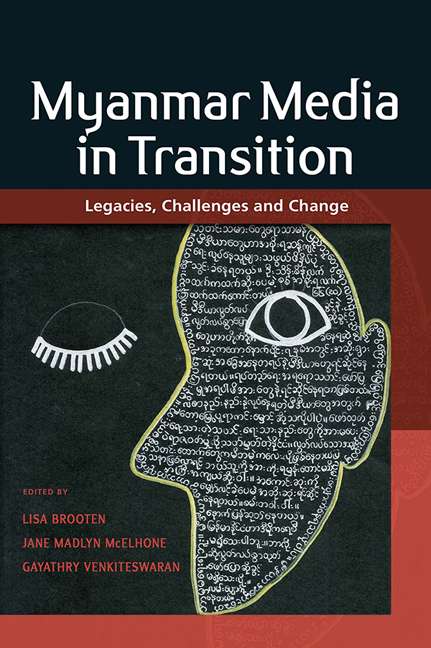Book contents
- Frontmatter
- Contents
- Contributors and Editors
- Burma or Myanmar? A Note on Terminology
- 1 Introduction: Myanmar Media Historically and the Challenges of Transition
- Part I Structural Constraints and Opportunities
- Part II Journalism in Transition
- 6 Silencing a Snakehead Fish: A Case Study in Local Media, Rural-Based Activism, and Defamation Litigation in outhern Myanmar
- 7 Precarity and Risk in Myanmar's Media: A Longitudinal Analysis of Natural Disaster Coverage by The Irrawaddy
- 8 Educating a New Generation of Watchdogs: Interview with Ye Naing Moe, Director of the Yangon and Mandalay Journalism Schools
- 9 The Metamorphosis of Media in Myanmar's Ethnic States
- 10 Covering Rakhine: Journalism, Conflict and Identity
- 11 Media in Myanmar: Laws, Military and the Public
- 12 Cracking The Glass Ceiling in Myanmar Media
- 13 Media and the 2015 General Elections
- Part III Creative Expression
- Part IV Society and Media
- Epilogue: Media Studies in Myanmar – Where Do We Go from Here?
- Index
10 - Covering Rakhine: Journalism, Conflict and Identity
from Part II - Journalism in Transition
Published online by Cambridge University Press: 07 September 2019
- Frontmatter
- Contents
- Contributors and Editors
- Burma or Myanmar? A Note on Terminology
- 1 Introduction: Myanmar Media Historically and the Challenges of Transition
- Part I Structural Constraints and Opportunities
- Part II Journalism in Transition
- 6 Silencing a Snakehead Fish: A Case Study in Local Media, Rural-Based Activism, and Defamation Litigation in outhern Myanmar
- 7 Precarity and Risk in Myanmar's Media: A Longitudinal Analysis of Natural Disaster Coverage by The Irrawaddy
- 8 Educating a New Generation of Watchdogs: Interview with Ye Naing Moe, Director of the Yangon and Mandalay Journalism Schools
- 9 The Metamorphosis of Media in Myanmar's Ethnic States
- 10 Covering Rakhine: Journalism, Conflict and Identity
- 11 Media in Myanmar: Laws, Military and the Public
- 12 Cracking The Glass Ceiling in Myanmar Media
- 13 Media and the 2015 General Elections
- Part III Creative Expression
- Part IV Society and Media
- Epilogue: Media Studies in Myanmar – Where Do We Go from Here?
- Index
Summary
In December 2016, I made my twenty-fifth reporting trip to Rakhine State in western Myanmar. More than any other state, and any other conflict, Rakhine has changed me and my understanding of my country.
Even though my family is a mix of four ethnicities, I grew up as a Burman Buddhist. That gave me a double majority status and privilege, both religious and ethnic. Living in the capital Yangon, my life was coloured by propaganda from the military government. In our school history books we could only read about the Great Burmese empire. The histories of the minorities were left out. From the state-controlled newspapers we learned that the ethnic armed struggle was an insurgent, rebel movement created by people who wanted to destabilize the country. No one mentioned that the Burman-led military had unjustly taken control of the ethnic lands. All I knew about minority ethnic groups was their traditional costumes and dances. I did not know why they were fighting, or how their lives were affected by conflict. I grew up in ignorance.
In this chapter I explore the challenge of gaining access, and remaining independent, in an ethnic state where you are expected to be on one side of the conflict or on the other. For decades the military junta restricted access to information and wielded a powerful propaganda strategy. This has had a long-lasting impact. There is a massive communication gap between the Burman lowlands and the ethnic states, characterized by historic misunderstandings and misinformation, especially now that social media platforms are the primary way to share information. This has both caused and perpetuated intercommunal conflict between Rakhine Buddhists and Rohingya Muslims. Information is a power and a weapon, with all sides distorting and exaggerating it. It is hard to trust what people say and to do accurate media coverage. Even the words you use to describe northern Rakhine and the Rohingya are highly sensitive. The fact that the military has closed off a large area in the north of the state where the Rohingya historically lived makes access and understanding all the more difficult. In this chapter I use my own experiences doing fieldwork, conducting interviews and building trust to explore identity and language politics in Rakhine State and to explain the challenges of getting to the truth.
- Type
- Chapter
- Information
- Myanmar Media in TransitionLegacies, Challenges and Change, pp. 229 - 238Publisher: ISEAS–Yusof Ishak InstitutePrint publication year: 2019



